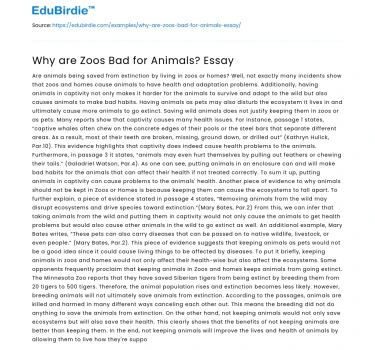Are animals being saved from extinction by living in zoos or homes? Well, not exactly many incidents show that zoos and homes cause animals to have health and adaptation problems. Additionally, having animals in captivity not only makes it harder for the animals to survive and adapt to the wild but also causes animals to make bad habits. Having animals as pets may also disturb the ecosystem it lives in and ultimately cause more animals to go extinct. Saving wild animals does not justify keeping them in zoos or as pets.
Many reports show that captivity causes many health issues. For instance, passage 1 states, “captive whales often chew on the concrete edges of their pools or the steel bars that separate different areas. As a result, most of their teeth are broken, missing, ground down, or drilled out” (Kathryn Hulick, Par.10). This evidence highlights that captivity does indeed cause health problems to the animals. Furthermore, in passage 3 it states, “animals may even hurt themselves by pulling out feathers or chewing their tails.” (Galadriel Watson, Par.4). As one can see, putting animals in an enclosure can and will make bad habits for the animals that can affect their health if not treated correctly. To sum it up, putting animals in captivity can cause problems to the animals' health.
Save your time!
We can take care of your essay
- Proper editing and formatting
- Free revision, title page, and bibliography
- Flexible prices and money-back guarantee
Another piece of evidence to why animals should not be kept in Zoos or Homes is because keeping them can cause the ecosystems to fall apart. To further explain, a piece of evidence stated in passage 4 states, “Removing animals from the wild may disrupt ecosystems and drive species toward extinction.”(Mary Bates, Par.2) From this, we can infer that taking animals from the wild and putting them in captivity would not only cause the animals to get health problems but would also cause other animals in the wild to go extinct as well. An additional example, Mary Bates writes, “These pets can also carry diseases that can be passed on to native wildlife, livestock, or even people.” (Mary Bates, Par.2). This piece of evidence suggests that keeping animals as pets would not be a good idea since it could cause living things to be affected by diseases. To put it briefly, keeping animals in zoos and homes would not only affect their health-wise but also affect the ecosystems.
Some opponents frequently proclaim that keeping animals in Zoos and homes keeps animals from going extinct. The Minnesota Zoo reports that they have saved Siberian tigers from being extinct by breeding them from 20 tigers to 500 tigers. Therefore, the animal population rises and extinction becomes less likely. However, breeding animals will not ultimately save animals from extinction. According to the passages, animals are killed and harmed in many different ways canceling each other out. This means the breeding did not do anything to save the animals from extinction. On the other hand, not keeping animals would not only save ecosystems but will also save their health. This clearly shows that the benefits of not keeping animals are better than keeping them. In the end, not keeping animals will improve the lives and health of animals by allowing them to live how they're supposed to.
Conclusion
With this in mind, we should not keep animals in Zoos or homes. Keeping animals out of Zoos and homes will not only improve the animals' health but also the ecosystem as a whole. Not to mention, but there have been many reports on health issues regarding animals that live in Zoos or captivity. Additionally, removing animals from the wild would disrupt the ecosystem's cycles and causing diseases to spread. This shows that animals are not only harmed by extinction but also many other components in Zoos and Homes. It's easy to see, that keeping and taking wild animals and putting them in Zoos and homes is not a great idea and that letting them free in the wild is the best idea.






 Stuck on your essay?
Stuck on your essay?

